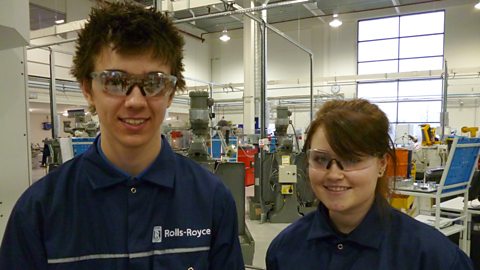NARRATOR:'High-tech engineer, dental nurse, hairdresser. An apprenticeship can be a great way to get yourself skilled up without going to uni. And earn some hard cash while you're training. There are currently over 1,500 types of job you can do as an apprentice. To find out more, we got together six school students. Each will discover what it's like to be an apprentice for a day. 'Here's Beth's story.'
BETH:Hi, I'm Beth, I'm 14. I'm studying English, maths and science GCSEs at school. I really like doing science and, on a Saturday, I work here. Hello, Prestige. When I am in the salon, I take appointments, do quite a lot of cleaning around, make sure that it's nice and clean. I really like the atmosphere, they're a really nice bunch of people to work with. I like to do my mum's nails quite a lot, if we're just like sat relaxing. If my mum isn't at home I like to be going out shopping with my dad, but I make sure he's got his credit card on him so I can spend his money. At this stage in my life, I think I need to have some good skills and qualifications so I can achieve my goal for where I want to be in the future. I don't really know much about an apprenticeship, but I think that I would like to know more.
MARRATOR:'Beth, and the other would-be apprentices, meet someone who knows plenty about jobs and how to choose the right one.'
AIMEE:When it comes to apprenticeships there are actually nearly a quarter of a million 16 to 18 year olds currently in apprenticeships in the UK, which is a massive number. And you can do all sorts of things there, you can have apprenticeships from hairdressing to nuclear scientist, so a wide range of career options.
AIMEE:Before even thinking about what apprenticeship you should take, I think it's really important that you guys start thinking about what you're good at. What's most important is that you enjoy what you do, because if you're happy then you'll be successful.
NARRATOR:'Beth has an in-depth session with careers mentor, Aimee.'
AIMEE:So, Beth, I'd like to know what it is you'd like to do with your career. Have you got any ideas yet?
BETH:Well, with my career I want to make it further and be involved with hairdressing.
AIMEE:OK.
BETH:And beauty therapy.
AIMEE:Have you worked in a hairdressing salon before?
BETH:I've got some experience
┤í▒§▓ÐÀíÀí:░┐░¡ÔǪ
BETH:within a salon.
AIMEE:Well that's fantastic because when you're going for apprenticeships and when employers are looking for new staff, anybody that's already got experience is going to I suppose it almost sort of, they think it's tried and tested. You've done that, you're definitely sure this is the career that you want to do.
BETH:Yeah.
AIMEE:OK. So, your nightmare job would be?
BETH:Sat in front of a computer all day.
AIMEE:OK. Alright. So what does the dream look like then?
BETH:Well, hopefully I'd be owning my own salon, doing hairdressing and beauty.
AIMEE:That's fantastic. So, how about we organise for you to spend the day with one of the UK's leading hairdressers?
BETH:Really?
AIMEE:Does that sound OK?
BETH:Yeah, that sounds really good.
AIMEE:OK, well let's do that then.
BETH:OK.
NARRATOR:'Beth is spending the day with twice winner of British Hairdresser Of The Year, Andrew Collinge.'
ANDREW COLLINGE:I think people really like to feel glamorous and really dress their hair well.
NARRATOR:'He has two salons employing recent graduate apprentices. And runs two purpose-built training academies, which have been classed as Outstanding by Ofsted. Currently, he's responsible for nearly 200 apprentices.'
ANDREW COLLINGE:I think this is great. I mean, I particularly like the fringe area because you've made it slightly a-symmetric. Which is always really flattering, rather than it just too straight. Looks great. Really good.
BETH:I'm ready to work.
NARRATOR:'Beth is going to shadow 17-year-old, Natasha. She's half way through a two-year apprenticeship here which will earn her an NVQ level 2. Students can stay on for a further year to take an advanced apprenticeship, gaining an NVQ level 3. Natasha shows Beth her prized possession - the kit case every apprentice gets when they start.'
NATASHA:If we open it, it's got everything you need inside. So you'll get all your clips, all your combs, your brush bag with all of your brushes in.
3500:04:11:21 00:04:16:19BETH:How come you chose to do an apprenticeship rather than being on a full-time college course?
NATASHA:I think it's more hands-on, really, if you're doing an apprenticeship. And plus you meet lots of new people. These are, like, people that you're going to know for quite a while, because you're working with them for so long. So you're making really good friends, like, lifetime friends maybe even. So, and it's more hands-on, more practical. You're getting experience of watching really experienced people do their work and do their clients so, really, you're just learning from watching.
ANDREW COLLINGE:Sometimes when you slide into cut, you can release the length gives the impression the hair being a bit longer. How's that?
BETH:Yeah.
ANDREW COLLINGE:That's a top tip.
BETH:So what subjects did you do in school that you find useful being a hairdresser?
NATASHA:Obviously you take maths and your English and stuff like that, so I passed both of them. I found it easier with the maths to mix up the ratios with the colours and the peroxide, so even though it's on the wall next to you, you still can work it out in your head how much you need and how much you've got to put in. And then, with your English, I think really it's just about speaking properly to the clients. ItÔÇÖs not about changing how you speak or making yourself sound posh, it's just speaking correctly to them.
BETH:Are there any downsides to having a hairdressing job?
NATASHA:The only thing is that you've got to wake up at like six o'clock in the morning sometimes, to come to work to be in for eight. But I love working earlies, it just makes the day go so much quicker.
BETH:'How important is it to be earning money while you're training?'
NATASHA:You feel better earning your own money because you don't have then go and ask your parents for money, and have to be constantly owing them money back. When you're working and you've got your own money it's fine, because you can go and do whatever you want with it because it's your money. You've earned it.
NARRATOR:'It's time to meet the boss and find out more.'
BETH:When you're employing apprentices, how do you decide on who to take on?
ANDREW COLLINGE:Well we're really looking for someone who's enthusiastic. Doesn't necessarily have to say they can, you know, have skills at that point but just really have the right attitude. It's well to try and do as well as you can at school, Say, for example, you have a GCSE level C and above in English and maths, then you won't have to do what's called Functional Skills otherwise when you're here, part of your day will be doing things like arithmetic and English. So doing well at school can really help you. You can sort of fast track and get on quicker learning how to be a hairdresser. Well that's incredible, I mean it really is. To be able to put the hair up that neatly, with hair that's so long requires real skill and to be doing this when you're only really halfway through the first year of training is fantastic. Apprentices and hairdressing go really well together. Yes, when you start, it's not particularly high wage but you are being paid while you train. And the great thing about hairdressing is the vast majority of people that do an apprenticeship go on to full-time employment. You can work in a salon, you can own your business. You can decide, if you want, to work on photoshoots. Become what's called a session stylist. If you've got top qualifications in hairdressing, it really is a passport to travel the world. Pull it so the ponytail sort of jumps away from the head slightly. So you can do that by taking a few sections and sort of wrapping it around. And then just put a grip in here.
BETH:I've heard that hairdressers are quite positive and happy people, is that correct?
ANDREW COLLINGE:You know, they do surveys from time to time, and hairdressers invariably come out at the top of the people most happy at work. And I think it is really good to be able to be creative all the time. No two hairstyles are ever the same, so every day is different. It's a job where you really control your own destiny. And I think everyone who's training here today would agree with me, that they really are in a very worthwhile career.
BETH:I've had a really good day today. I've learnt a lot of being in a big teaching environment. As soon as I'm 16, I'm signing up for a hairdressing apprenticeship.
Video summary
14 year-old Beth tries out being an apprentice hairdresser for a day.
Beth gets some helpful advice about how to choose a career from a leading careers mentor, Aimee Bateman.
Beth finds out what employers are looking for from one of BritainÔÇÖs top hairdressers and shadows 17 year-old apprentice hairdresser Natasha Brass.
An apprenticeship can be a terrific way into a job, to earn while you learn and can offer a real alternative to University for many young people.
With school students now having to stay in full time education or training until the age of 18, this clip provides plenty of useful advice to those who may benefit from a vocational education setting.
This is from the series: Apprentice for a Day
Teacher Notes
The clip shows that pupils need to actively choose and manage their careers, e.g. by asking questions and planning ahead.
They can come up with a list of questions to ask a careers adviser, an apprentice and an employer about apprenticeships in the sectors that interest them.
Careers and PSHE staff can discuss what pupils need to know about apprenticeships, e.g. what they are, what employers are looking for, how to find out if an apprenticeship would suit them.
They can discuss with pupils how to weigh up the pros and cons of choosing an apprenticeship over other career pathways.
Staff can use the clip with pupils to discuss why hairdressers report a high level of job satisfaction and what are the variables that impact on career happiness.
English and maths teachers can use this clip to illustrate the importance of getting good GCSE grades in both subjects if pupils want to avoid holding themselves back in a wide range of career.
Pupils can research apprenticeship vacancies and other useful information at:
For information about different types of jobs and careers:
For specialist advice and information, they can contact the National Careers Service helpline (0800 100 900) or talk to the careers adviser in their own school.
This clip will be relevant for teaching Business and PSHE Citizenship at Key Stage 3 and Key Stage 4/GCSE, in England and Wales and Northern Ireland.
Also at 3rd and 4th Level in Scotland.
Apprentice outdoor education tutor for a day. video
15 year old Evie tries being an apprentice outdoor education tutor for a day.
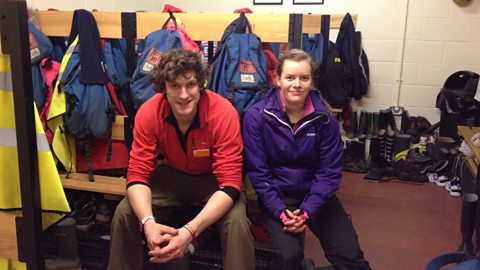
Apprentice plumber for a day. video
15 year old Courtney tries out being an apprentice plumber for a day.
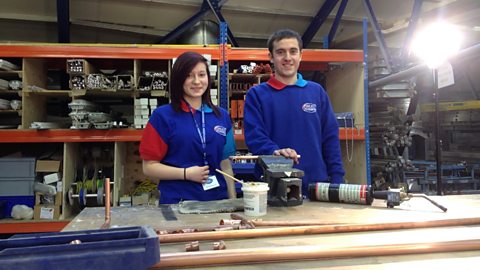
How to prepare a CV and perform in a job interview. video
Advice from careers mentor Aimee Bateman on how to create an amazing CV and cover letter plus job interview tips.
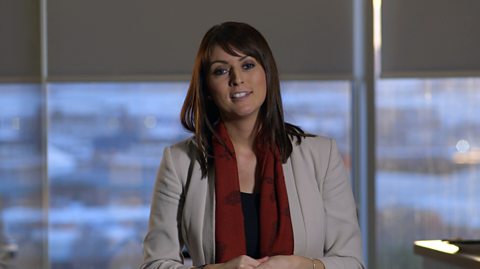
Apprentice chef for a day. video
15 year old Ellie tries out being an apprentice chef for a day.
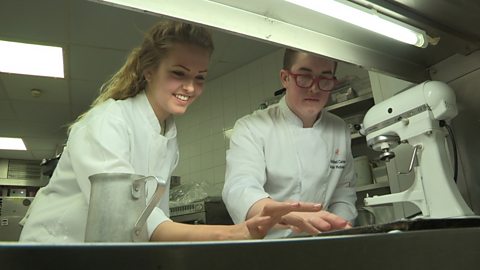
Apprentice dental nurse for a day. video
17 year old Josh tries out being an apprentice dental nurse for a day.
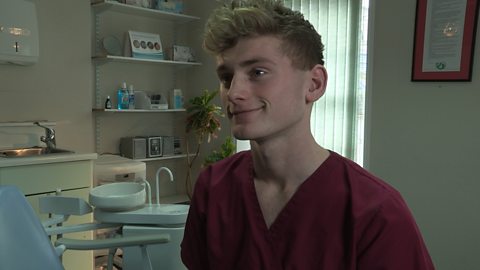
Apprentice engineer for a day. video
17 year old Lewis tries out being an apprentice engineer for a day.
